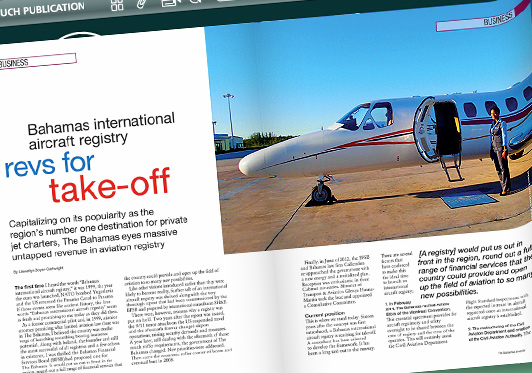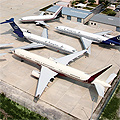| Published: Date: Updated: Author: |
The Bahamas Investor Magazine July 23, 2015 July 23, 2015 Llewellyn Boyer-Cartwright |
The first time I heard the words “Bahamas international aircraft registry,” it was 1999, the year the euro was launched, NATO bombed Yugoslavia and the US returned the Panama Canal to Panama. If those events seem like ancient history, the four words “Bahamas international aircraft registry” seem as fresh and promising to me today as they did then.
Click here to read or browse this feature using Turn-Page/Ezine mode.
As a former commercial pilot and, in 1999, a junior attorney practicing what limited aviation law there was in The Bahamas, I believed the country was on the verge of launching something bearing immense potential. Along with Ireland, the founder and still the most successful of all registries and a few others in existence, I was thrilled the Bahamas Financial Services Board (BFSB) had proposed one for The Bahamas. It would put us out in front in the region, round out a full range of financial services that the country could provide and open up the field of aviation to so many new possibilities.
Like other visions introduced earlier than they were likely to become reality, further talk of an international aircraft registry was shelved along with the very thorough report that had been commissioned by the BFSB and prepared by international consultants SH&E.
There were, however, reasons why a registry was put on hold. Two years after the report was issued, the 9/11 terror attacks on the US suspended travel and the aftermath forever changed airport operations, raising security demands and measures. A year later, still dealing with the aftermath of those much stiffer requirements, the government of The Bahamas changed. New priorities were addressed. Then came the economic roller coaster of boom and eventual bust in 2008.
Finally, in June of 2012, the BFSB and Bahamas law firm Callenders re-approached the government with a new energy and a revitalized plan. Reception was enthusiastic in three Cabinet ministries. Minister of Transport & Aviation Glenys Hanna- Martin took the lead and appointed a Consultative Committee.
Current position
This is where we stand today. Sixteen years after the concept was first introduced, a Bahamas international aircraft registry is readying for take-off. A consultant has been selected to develop the framework. It has been a long taxi out to the runway. There are several factors that have coalesced to make this the ideal time to launch an international aircraft registry:
1. In February 2014, The Bahamas ratified Article 83bis of the Montreal Convention.
This essential agreement provides for aircraft regulatory and safety oversight to be shared between the state of registry and the state of the operator. This will certainly assist the Civil Aviation Department Flight Standard Inspectorate with the expected increase in aircraft registered once an international aircraft registry is established.
2. The restructuring of the Civil Aviation Department and creation of the Civil Aviation Authority.
The Bahamas had to separate the regulatory and safety oversight regimes that comprises its Civil Aviation Department. A far different airport and airline oversight regime will emerge when officials complete their move this year to new premises.
The government has also secured funding from the Inter-American Development Bank (IDB) for training with a special focus on beefing up The Bahamas’ air traffic controllers component of operations and other improvements in a bid to meet International Civil Aviation Organization (ICAO) standards at all airports.
The government is also in negotiations with the Federal Aviation Administration (FAA) regarding the regaining of control of its airspace, which will of course increase government revenue and create further employment. Airport privatization or quasi privatization will allow airports such as Marsh Harbour and North Eleuthera on heavily trafficked islands to improve traffic flow and safety while providing business opportunities to Bahamians.
In aviation, as in other industries, we must think long term for the future of those generations that will come after us.
3. The industry climate is right.
Boeing has set all-time records in the past two years with gross bookings in 2013 for 1,619 aircraft, with 626 jetliners delivered to 93 customers in a single year. In fact, Airbus has already delivered its new state-of-the-art Airbus A350 to Qatar Airways. And, at the other end of the commercial market, after a bit of a slump, orders for business and corporate jets are skyrocketing.
Bombardier, which handles about half of all business aircraft orders, recently forecast it would deliver 22,000 business aircraft over the next 20 years with a total value of $617 billion. Every one of those aircraft has to be registered somewhere and I believe The Bahamas has an excellent, though narrowing, window of opportunity to seize the high-quality corporate jet and business aircraft dimension of the market. We need only to look at the success of Isle of Man and Aruba or even at Guernsey in the Channel Islands, which launched its registry in December of 2013 and in a little more than a year had $389 million in registered aircraft.
4. The Bahamas is in a very strong position in the Caribbean region as a favourite for private jet charters.
Nassau ranks No 1 of the top 10 destinations within the region for such charters. The business added $278 million to the economy in the fiscal year 2013/14 and we have barely tapped the potential that will only be revealed when the international registry is introduced.
Missing piece
While most components required for a registry are in place, one remains outstanding: The Bahamas’ ratification of the Cape Town Convention on International Interests in Mobile Equipment or the Cape Town Treaty.
The purpose of the Treaty is to homogenize movable property transactions. In the case of aircraft and transactions related thereto this is achieved through the international aircraft registry based in Dublin, Ireland whereby agreements for sale, charges, mortgages, among others, may be recorded. It also provides legal remedies for the repossession of aircraft and engines and defaults in financing agreements.
In other words, anyone who has some interest in an aircraft whether it be a lessor, financier or insurer is protected globally.
To date there are 63 signatories to the Cape Town Treaty with the UK expecting to ratify this year. The UK’s ratification will surely make it easier for Bermuda, the Cayman Islands and the Isle of Man to sign on. Many will agree that while the Treaty may not be perfect, it surely facilitates with ease the registering
of aircraft.
Sky’s the limit
Benefits from an international aircraft registry can be extraordinary. To the high-net-worth client who has assets and wealth management services in The Bahamas, perhaps a yacht or megayacht with Bahamian registry, this is the last piece of the financial services package.
Loyalty to The Bahamas encourages visits and often leads to real estate sales and other related transactions.
To the financial services industry, it means company formation and annual registration, as every registered aircraft may have to be owned by a Bahamian company. It also means insurance, legal work with respect to leasing, financing and registration.
For government, it means ongoing fees, not only in initial company incorporations, but annual renewal fees and aircraft registration fees.
On a broader scale, it can open up vast new segments of the aviation industry for young Bahamians. They can train as pilots, as several recently have, through a business aircraft pilots course at the Bahamas Technical and Vocational Institute (BTVI). It can generate the need for more repair and maintenance facilities. The Bahamas can become the regional hub for training, parts, supplies, catering and a dozen other aspects of the aviation industry that are only in their infancy in this country.
Quality flag
Like the Bahamas Ship Registry, we must ensure that we are a quality flag and not a flag of convenience. With an adequate, efficient and client- friendly framework, high standards for quality registration and alleviation of customs duties–an absolute requirement for an attractive registry–I am fully convinced that an international aircraft registry has the potential to do for the aviation industry in The Bahamas what the ship registry and the Bahamas Maritime Authority did for The Bahamas’ role in ship registration.
If ever there is a doubt about the value of that registry, one need only to look at the list of the cruise lines and commercial vessels that today proudly carry the Bahamian flag–Disney, Carnival, Holland America, Crowley. It is because of the registry that Carnival invested in what is now a $200-million shipyard in Grand Bahama, the largest in the region and perhaps the most fertile field in Grand Bahama for employment, promotion and economic benefits to the community.
Where the ship registry and the aircraft registry will differ, I believe, is in the number of entrepreneurial opportunities, which are virtually infinite in aviation. Every time I speak at a function or on radio I get phone calls from young people wanting to know what to study or how to make a career in the aviation industry. It is for those people and for The Bahamas’ standing in an increasingly sophisticated and demanding world of asset management that we must find new ways of doing business with purpose and principle.
I believe the Bahamas international aircraft registry holds an important key to our future as a valued partner in the global aviation and corporate community and in the world of financial services, satisfying client needs while unleashing untapped potential for individuals, business, industry and the country. Aviation is multifaceted, truly dynamic and The Bahamas is very close to take-off, ushering in a new economic dimension in financial services with unlimited potential to impact the broader economy for generations to come.










